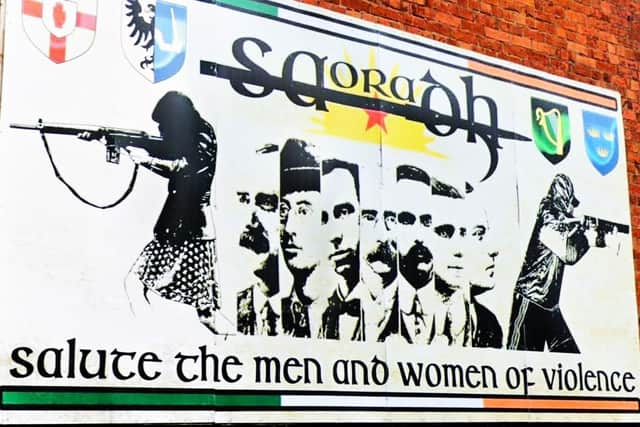Dissident republican group Saoradh calls Stormont a 'quisling assembly' and vows to 'resist its role in British rule' as it gives analysis of DUP deal with the UK government to restore power-sharing
and live on Freeview channel 276
The organisation described the east Belfast parliament as a “British puppet administration” whose every incarnation has “failed miserably, because partition has failed miserably”.
Saoradh’s official position is that Stormont itself is unlawful, as are the Dail and Seanad in Dublin.
Advertisement
Hide AdAdvertisement
Hide AdThat’s because “any assembly claiming to speak for the Irish people without being elected by the united people of the Irish nation is illegal”, the group believes.


Founded in 2016, the group “does not believe that British imperialism or capitalist exploitation can be confronted in the structures they have created to consolidate their undemocratic control of the Irish nation”.
It describes itself as a political party, but does not appear on the registered list of parties held by the Electoral Commissions of both Northern Ireland and the Republic.
Saoradh is often described as the “political wing of the New IRA” – something which it denies.
Advertisement
Hide AdAdvertisement
Hide AdIts constitution says members can be removed for damaging property or “behaviours that pose a threat to health or safety of any person including violence or threats”.
In a statement issued this week after news of a DUP deal with the Tories emerged, Saoradh criticised those politicians who “want to make this place work” (on the basis that Northern Ireland cannot work because it is a failed statelet), and noted that the government intends to enact legislation at Westminster to “further consolidate the union”.
It said: “The Republican analysis since partition has been consistently vindicated – that the apartheid six-county state is unworkable and unsustainable, that partition has been a disaster, that partition and occupation are a denial of sovereignty, that the continued denial of national self-determination creates the conditions for conflict and that Irish freedom is the only way to secure a just and lasting peace in our country.
“Any continuing manifestation of British Rule in Ireland cannot create sustainable and effective government – and that is true across the entire country given the corrupt nature of various 26-county administrations since 1921.
Advertisement
Hide AdAdvertisement
Hide Ad"The Irish people should be free to assert our own national sovereignty and establish structures to govern that will ultimately redistribute the wealth, take ownership of national resources and industry, and empower the people rather than cabals.
“Saoradh remains committed to opposing British rule, and by extension, the puppet parliaments implementing it.
"‘Devolution’, ‘home rule’, and whatever other term is used to describe quisling assemblies can not hide what it really is – a collaboration congress.”
‘Quisling’ emerged as a term for traitors and collaborators after Vidkun Quisling became the Nazi puppet governor of occupied Norway during WWII. He was later executed.
More on Saoradh here:
-
– INLA-linked group also gives its take –
Advertisement
Hide AdAdvertisement
Hide AdMeanwhile another fringe republican group, the IRSP (Irish Republican Socialist Party) also released a statement analysing the deal.
The IRSP was set up as the political wing of the INLA in 1974 by feminist activist Bernadette Devlin / McAliskey and republican paramilitary Seamus Costello.
Whilst the Workers’ Party, which grew out of the Official IRA (just like the INLA), has moderated its stance in recent decades, the IRSP holds to a harder line.
It described the deal as “a British declaration of intent to remain”, adding that it is proof “the constitutional nationalist program for Irish unity was outflanked, out-manoeuvred, and rendered impotent by the Good Friday Agreement of 1998”.
Advertisement
Hide AdAdvertisement
Hide Ad“Britain’s questionable assertion in the Downing Street Declaration of 1993 that they had no ‘selfish, strategic or economic interest in Northern Ireland’ laid the groundwork for the Good Friday Agreement. That claim has been smashed to pieces in today’s DUP deal.
“They have declared that their position on the Union is no longer neutral, but rather is based on ‘conviction’ and now intend to drive this point home by announcing plans to reset social, political and trading arrangements between the six counties and England.
“The key republican demand of the twentieth century was a British declaration of intent to withdraw from the six counties.
"Today Britain has announced their intention to remain.”
It concludes: “An entire generation of nationalists and republicans were betrayed by the Good Friday Agreement and Britain’s most recent declaration has confirmed this fact.
Advertisement
Hide AdAdvertisement
Hide Ad"It is more important than ever that republicanism, republican socialism and progressive nationalism assert their right to explore routes towards unity and independence on our own terms and not be confined by the constricts of Britain’s Good Friday Agreement.
“The IRSP restate our opposition to its principles and remain constructively critical of those who continue to endorse the GFA and its institutions in Ireland.”